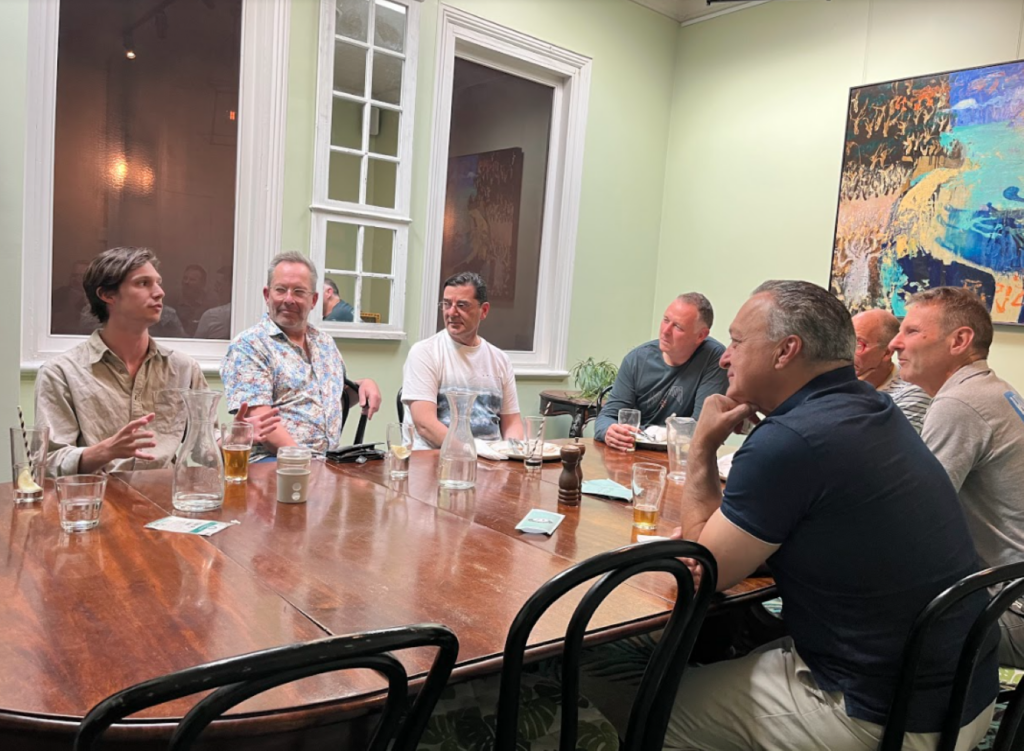When men first turn up to an ‘entree’ event run by The Men’s Table, it’s made explicit that this is a place where you can have a real conversation.
It’s an assurance that isn’t usually offered in spaces where men gather, but it’s a key action The Men’s Table takes to support men in having open conversations and developing meaningful social connections.
“We’ll talk about what’s really going on, highs and lows,” David Pointon, co-founder and CEO of The Men’s Table tells Women’s Agenda.
At The Men’s Table, groups of 10-12 men across Australia meet once a month over dinner to share the highs and lows of their lives and how they’re really feeling with each other.
Pointon explains that this assurance of having real conversations allows men to drop into a level of social intimacy and connection that they may not get the opportunity to do in their everyday lives.
“Our tagline is ‘go beyond banter’, because traditionally when men are together, there’s a tacit agreement not to go into anything that’s got vulnerability or intimacy, or genuine authenticity in it, because it could be too confronting, too challenging, and we don’t do that as blokes, right?” Pointon says.
“And so, then there’s a missed opportunity when men are together and communicating, to not drop into that intimacy, that level of connection.”

Loneliness is a key social issue facing Australians, with Medibank’s latest Loneliness Population Index showing more than half of Australians feel lonely in a typical week. Having few friends, or growing apart from friends, was cited as the top trigger for loneliness in Medibank’s research, with 53 per cent of people identifying with it.
For Australian men, a recent longitudinal study found increased social isolation, romantic partnership dissolution and strong beliefs around traditional gender roles are all associated with high levels of men’s loneliness. The loneliness crisis is so severe that one out of four Australian men say they have no one to confide in about their worries and fears.
Pointon says most Australian men, particularly those in middle age, tend to have more “traditional” ideas about being a man. And this can feed into the feelings of social isolation and loneliness that impact men across all corners of society.
“That’s how I was raised,” Pointon says. “That’s how a lot of us were raised. And it seems to cut across many cultures as well.”
“We’ve got some inbuilt inhibitors. So even just the simple act of a five-year-old in the playground saying, ‘will you be my friend?’ It’s an act of vulnerability, isn’t it?”
“You’re opening yourself to rejection. And so men don’t go there. Whereas women have learned, I think, to be okay in that more vulnerable openness.”
Forty per cent of the men who attend The Men’s Table are looking for friendship, Pointon points out.
“We are providing a solution that attracts at least some men who know that they are lonely,” Pointon says.
“Not everyone comes to a Men’s Table because they’re lonely, but friendship and connection is by far and away one of the key reasons. Looking for a real conversation is also another.”
A powerful act of trust
In 2024, 95 per cent of men involved with the Men’s Table said it was a safe place to share and be vulnerable.
“We’ll often hear men say something like, ‘I feel closer or more connected to the men at my Men’s Table after six months than I do with my golfing buddies after 25 years,” Pointon shares.
“There’s that sense in the conversation that it’s more authentic and more real, and they learn to express themselves, but they also hear from others, and it gets normalised.”
There’s no fee for attending a Men’s Table or any membership to sign onto. This model helps men to build trust and rely on one another, Pointon says.
“The way a table holds together is simply that each of them has made an agreement with the others that I’m going to show up,” he says.
“I’ll be here for myself and for you and it’s reciprocated. That’s a powerful act of trust.”
The hallmarks of a healthy community
As time goes on, this trust leads the men at The Men’s Table to feel a sense of belonging. This is a powerful tool in the face of loneliness.
“[The men] belong to something that’s bigger than themselves, or bigger than just their workplace. It sits outside their normal world, and it’s got many of the hallmarks of a healthy community, which is showing up for each other, embracing diversity,” Pointon says.
“There are diverse people that show up. You haven’t picked your own team. You’ve got all sorts of people with different backgrounds. That sort of connection and conversation and community are the pillars of what we see happens at a table.”

A ‘ripple effect’
Far beyond supporting men to build better social connections and mental health, The Men’s Table is also a powerful tool for men to improve their relationships with the women in their lives.
Many female partners of men who’ve taken part in the program say it has led to them becoming better listeners and more emotionally attuned. Indeed, one woman told The Men’s Table that her husband’s involvement was an important step in maintaining their relationship.
“I really feel that if we didn’t make a change our marriage would not have survived. The Men’s Table was an important step in maintaining our relationship and our marriage,” she said.
Pointon says it’s often women who encourage their husband or male partner to attend their first event. This initial push can lead to long-lasting positive outcomes.
“We’ve done some research with the women who are either partners or mothers or daughters of men at tables. And the women say men are better listeners. They say that there’s more emotional attunement in the home, there’s less anger and violence in the relationship,” he says.
“So there’s a ripple effect that’s going on into the families.”
To learn more about Medibank’s commitment to reducing loneliness head to We Are Lonely | Medibank.
About the research
Research commissioned by FiftyFive5 on behalf of Medibank. Research was conducted in July 2024, among a sample of (n=4,131) Australians.
If you need to speak to someone now, you can reach Beyond Blue on 1300 224 636 or call Lifeline on 13 11 14.

